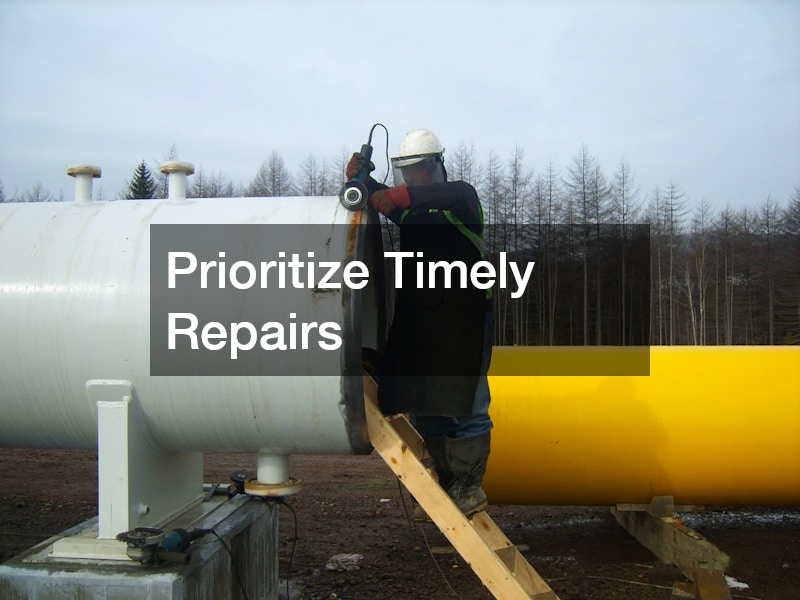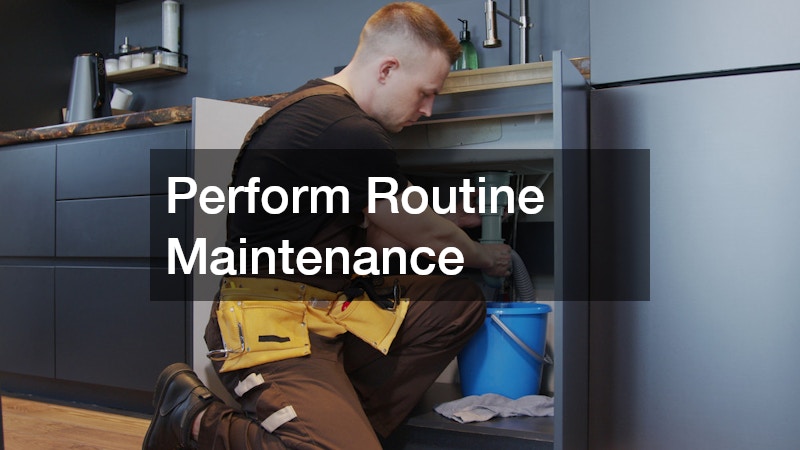Efficient plumbing and HVAC systems hold significant importance for maintaining a comfortable and cost-effective home environment. As energy costs continue to rise, homeowners are increasingly seeking methods to optimize their utilities. System efficiencies have direct financial benefits and enhance the overall comfort, reliability, and sustainability of a home. By focusing on tbd through the implementation of strategic improvements, homeowners can achieve significant reductions in both utility costs and environmental impact. In this article, we will explore ten critical steps that can help you maximize the efficiency of your plumbing and HVAC systems, thereby ensuring the smooth operation of these essential home infrastructures.
1. Prioritize Timely Repairs

Timely repairs, especially sewer line repair, play a crucial role in maintaining the efficiency and longevity of a home’s sewer system. Ignoring minor issues can lead to significant problems, including blockages and backups that can severely impact household operations. Regularly checking for signs of wear or damage can save homeowners from expensive and disruptive failures, ultimately promoting tbd.
When tbd is prioritized, it not only extends the life of the system but also improves its performance, saving energy and water. A pipe issue unattended can escalate, causing inevitable surges in water usage and thus higher bills. Addressing repairs promptly ensures that your plumbing is running smoothly and efficiently, preventing leaks that waste valuable resources.
Additionally, maintaining an active relationship with a local plumber ensures quick action when issues arise. Having local experts familiar with regional infrastructures can drastically cut down the diagnosis and repair times. They can provide targeted solutions that enhance the efficiency of your tbd, which is essential for a seamless and resource-efficient home system.
2. Consider Alternative Approaches
When it comes to plumbing system maintenance, considering alternative approaches like pipe lining services can be highly beneficial. These services offer modern solutions that can improve the efficiency of older systems without the need for extensive renovation. Pipe lining involves coating the inside of pipes, which restores the integrity and flow without the cost and hassle of full replacement, significantly advancing the aim for tbd.
Utilizing alternative methods caters to the needs of diverse plumbing systems and prevents excessive water usage. Many traditional methods of fixing plumbing issues can be invasive and result in lengthy downtimes for parts of the home. However, pipe lining services offer less disruptive solutions while maintaining structural integrity, which promotes efficient operation.
This approach is ideal for those seeking longevity from their current systems without major overhauls. Homeowners can depend on pipe lining to be a cost-effective solution that meets their tbd goals. Additionally, understanding and using these alternative strategies can significantly reduce energy and water wastage, making them a great asset in efficiency discussions.
3. Choose Local Contractors
Selecting local contractors, such as a local plumber when addressing plumbing and HVAC needs, ensures familiarity with the area’s specific conditions. Local experts typically have comprehensive knowledge of the regional climate and infrastructure, allowing them to offer tailored solutions for tbd. This can lead to better service and results when managing system efficiency.
Local professionals contribute significantly through insights that might be overlooked by outside contractors. They understand local bylaws, typical weather conditions, and soil characteristics, making their interventions more accurate and reliable. Their insights can crucially impact the performance and efficiency of your systems, aiding in tbd.
Moreover, engaging with local businesses boosts the economy and develops strong community ties. The commitment to service excellence present within local firms not only benefits the individual homeowner but also enhances market standards. Over time, utilizing local knowledge helps create a robust system that meets efficiency and sustainable energy goals.
4. Ensure Proper Insulation

Proper insulation is fundamental in enhancing HVAC system efficiency. Insulating the home adequately, including considering foundation repair where needed, ensures that heating and cooling systems work optimally without unnecessary energy expenditure. Upgraded insulation minimizes heat escape during winters and keeps interiors cool during summers, thereby achieving tbd.
When your insulation is effective, it significantly reduces the workload on HVAC units. Systems consume less energy because they don’t have to compensate for lost or gained heat. This not only conserves energy but extends the lifespan of your HVAC systems, striking a balance between comfort, cost, and tbd.
Regular assessments of the home’s insulation can uncover areas that need improvement. Addressing these early by partnering with knowledgeable professionals allows optimized temperature control across your home and sustains an ideal indoor environment throughout the year. Efficient insulation is hence a cornerstone of reduced energy usage and systemic excellence.
5. Take Preventive Measures
Preventive measures are instrumental in promoting plumbing system efficiency. Engaging a local septic service for regular checks and maintenance helps prevent common septic issues that could lead to major system breakdowns. Preventive strategies ensure that systems function correctly and continue to evolve towards tbd.
Regular inspections and maintenance services reveal potential issues before they become significant, avoiding costly repairs and ensuring smooth system operation. By incorporating preventive actions into routine service calls, homeowners can better prepare their house systems for unforeseeable circumstances, protecting against functional disruptions.
Preventive care not only safeguards the existing systems but is also a responsible approach to resource management and wastage reduction. It leads to sustainable practices that enable homes to be more environmentally friendly while ensuring they reach their optimum operational efficiency. Overall, preventive measures pay dividends in efficiency improvements.
6. Ask Intentional Questions
Whenever repairs are necessary, asking intentional questions, be it about local sewer line repairs or otherwise, can vastly improve outcomes. Knowledgeable homeowners make informed decisions that ensure repairs are both effective and efficient, aligning closely with tbd goals. Asking the right questions during service interactions aids in ensuring thorough comprehension of procedures and expected outcomes.
This proactive approach keeps the homeowner informed and involved, which can lead to greater satisfaction with the services rendered. Inquiring about repair alternatives, sustainability options, and future-proofing recommendations often results in services that yield long-term benefits and robust efficiencies.
Moreover, developing a rapport with service providers facilitates open communication channels, leading to enhanced service delivery and satisfaction levels. By fostering a deeper understanding and ensuring clarity, homeowners can more effectively achieve the operational goals of their HVAC and plumbing systems, driving home tbd.
7. Perform Routine Maintenance

Routine maintenance, including activities like drain cleaning, is vital for maintaining the efficiency of plumbing systems. Consistent checks and upkeep prevent minor issues from snowballing, providing significant dividends in terms of tbd over the lifetime of your home systems. This type of regular maintenance ensures optimal functionality and reduces unexpected repair scenarios.
Effective routine maintenance identifies potential blockages and removes them before they become full-blown problems, thus maintaining optimal flow and reducing energy usage. By preserving system health, drain cleaning reduces stress on pipes and components, extending the lifespan of the entire plumbing system.
Engaging professional services for regular upkeep means expert eyes evaluate and clean your systems, ensuring comprehensive care and preventive strategies. These systematic checks are key in identifying inefficiencies and offering solutions to improve operational tbd, further rooting the practice as a cornerstone of home maintenance strategies.
8. Hire Experienced Services
Hiring an experienced air duct cleaning service is critical when aiming for enhanced HVAC system efficiency. Professional services ensure thorough cleaning, removing dirt and contaminants that can impair system performance. This directly contributes to tbd by promoting better air quality and system efficiency.
Expertise matters significantly in duct cleaning as incorrect cleaning can lead to more harm than good. Professionals bring specialized tools and a deep understanding of system dynamics to the table, ensuring the work is completed to the highest standard. This leads to long-term savings and enhanced system integrity.
Trusted professionals provide valuable insights into maintaining your systems, offering advice on prolongation strategies and more efficient usage of resources. The thoroughness and expertise they bring cannot be overstated, making them essential in the pursuit of home efficiency and optimal HVAC performance.
9. Seek Expert Guidance
When it comes to making critical HVAC decisions, such as a furnace install, seeking expert guidance can determine system efficiency and longevity. Professionals can provide insights on the most appropriate systems and settings tailored to your home’s specific requirements, consistently aligning with tbd and sustainability efforts.
Expert consultation ensures you choose the best equipment for your needs, particularly in achieving cost-effective comfort. Their knowledge assists in optimizing system settings for balanced energy use, leading to reduced utility bills and improved overall system performance over time.
Establishing a relationship with industry experts also means access to ongoing support and rapid troubleshooting, preventing minor concerns from ballooning into larger problems. The value of expert insight lies in the ability to use practical experience-driven advice to refine and innovate effective home efficiency strategies.
10. Strike a Balance

Balancing comfort and efficiency is crucial when optimizing home systems, whether dealing with plumbing issues or energy sources like heating oil. Effective system management walks the line between maximizing economic input and obtaining a satisfying living environment, thereby achieving harmony in tbd.
Understanding the thermostat’s role and embracing technology like smart thermostats allows homeowners to orchestrate comfort without excessive expenditure. Tailored strategies can regulate energy consumption while rendering the desired comfort level, proving essential in home management.
The focus on balance extends to mindful usage and sustainable practices, supporting long-term environmental goals. Considering efficiency as a living practice rather than a one-time investment provides clarity and results, allowing for both current enjoyment and future preservation of resources.
Improving plumbing and HVAC system efficiency involves taking a comprehensive approach, from scheduling timely repairs to investing in expert guidance. Emphasizing alternative solutions, engaging local contractors, ensuring adequate insulation, and performing routine maintenance are all pivotal. Together, these steps foster a balanced and efficient home environment, achieving significant utility savings and sustainable living commitments for a better future.


